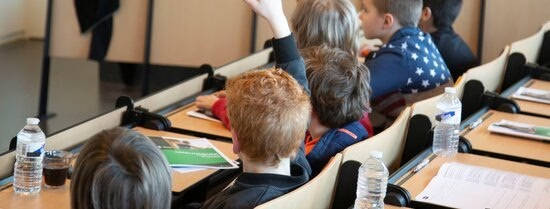Fatigue, difficulty concentrating, stomach aches. These can all be consequences of stress. And unfortunately, they are becoming increasingly common. Not only in adults, but also in elementary school students. That's why our university's 'Wetenschapsknooppunt' has set up a lesson series on resilience and assertiveness for grades 6, 7 and 8. "We teach children how to deal with difficult situations, so that they don't freak out when they experience something like this. The younger you learn that, the easier it is to continue to grow and develop in that," says Rowan Huijgen, Wetenschapsknooppunt project leader and creator of the lesson series.
Doing your own research and learning life lessons
Many Dutch universities have a Wetenschapsknooppunt. The goal of a Wetenschapsknooppunt is to bring science to the classroom. "We do this through inquiry-based learning, so that children are engaged themselves. The great thing about this new curriculum is that in addition to doing their own research, the children also learn important life lessons. Namely dealing with difficult situations. Everyone encounters that at some point in life," says Rowan.

"Dealing with setbacks and uncertainties at school or at home is an important skill to learn"
Rowan Huijgen
No intense difficulties
No very difficult situations come up during the four lessons. Examples of what the children do discuss with each other are: I failed my test, I am not allowed to play along, I have a fight at school. "These are events that children experience in class and can be shared well in the group. During the project, each child should feel safe."

Students learn in a playful way what difficult situations are and what options are available for dealing with them. Each lesson focuses on a video. Not an acted film, but a video with real people with real problems. "We asked people on the street about their misfortunes. The stories in the videos vary enormously. From a top athlete who got injured and could not fulfill his dream to a woman who is afraid of dogs and therefore no longer dares to go shopping. The great thing is that children see that everyone faces difficult situations from time to time. With some, everything seems to come together. But everyone has to deal with difficult situations at some point. The message is that there are always ways to deal with them. By seeking help, talking about it or doing things yourself to solve it."

Learning from others
In another form of work in the lesson series, students engage in theater. In it several examples emerge of how to handle difficult situations. The children interview each other, map out how they would handle a situation and learn from others how things can be done differently. "It's a program where students learn about their own preferences. They learn from others and see that you can also handle some situations differently. We also do as many different forms of work in the lessons as possible, so the children are all doing something they are good at and enjoy," Rowan says.
The curriculum has been sent to 50 partner schools. But it is also available as a free online download for everyone. "Your own teacher gives the lessons. Difficult situations are not so easy to discuss with a strange teacher in front of the class. You have to trust someone a bit, and that's often your own teacher. This curriculum is really about the students themselves and that they can get to know themselves better, become more resilient and learn from others. Unfortunately, we see that achievement pressure and fear of failure are becoming more common in elementary school. Hopefully these lessons will help remedy some of that. The great thing is that the curriculum has already been downloaded many times in the first month."
- More information
The curriculum was largely created by Marianne den Hertog and input from a science perspective was provided by Ruth van der Hallen. Want to know more about the science hub? Check out our website for more lesson plans.
- Related content

